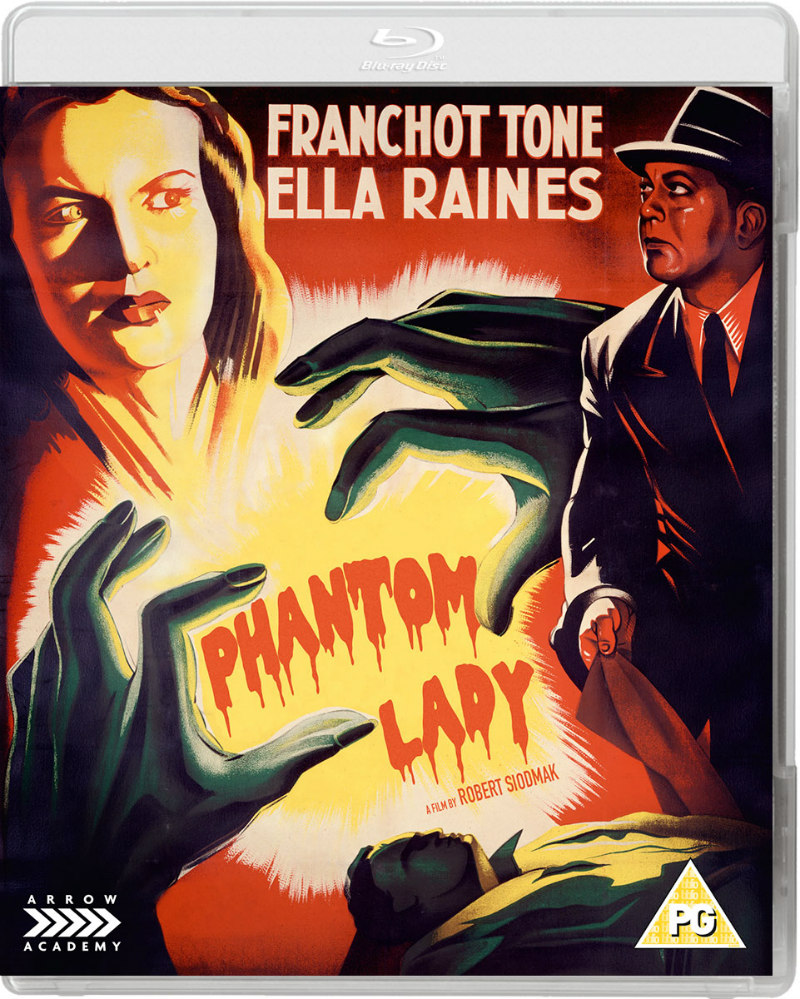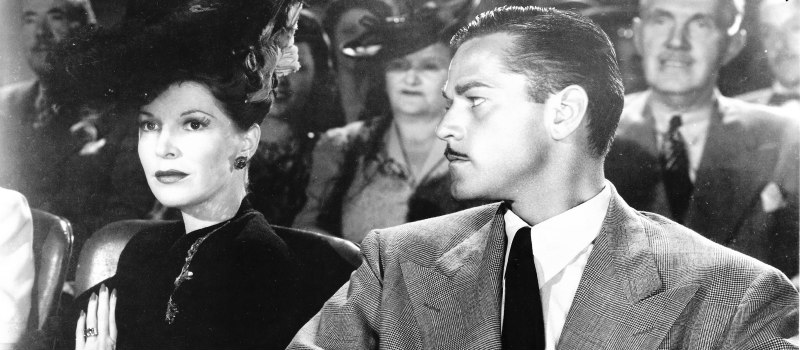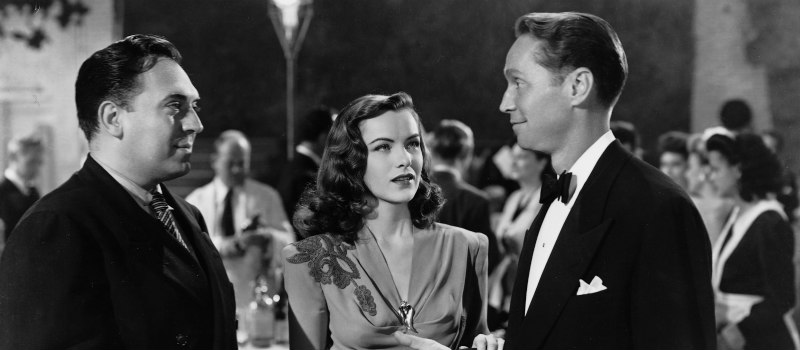
When her boss, whom she is secretly in love with, is accused of murder, a secretary sets out to prove his innocence.
Review by Eric Hillis
Directed by: Robert Siodmak
Starring: Franchot Tone, Ella Raines, Alan Curtis, Aurora Miranda, Elisha Cook Jr., Fay Helm

"Men are afraid that women will laugh at them. Women are afraid that men will kill them." So goes a quote often attributed to Canadian novelist Margaret Atwood, who is believed to have uttered it at some time in the '80s. It's a sentiment that's grown in usage in recent years, but Hollywood screenwriters were well aware of this dynamic as long ago as the 1940s.
In Robert Siodmak's 1944 thriller, Phantom Lady, a woman is killed by a man because she laughed at his inadequacies. The victim's husband is arrested for her murder and sentenced to death. She laughed at him too, but he wasn't the one who strangled her with a necktie. At the time of his wife's murder, Scott Henderson (Alan Curtis) was in the front row at a Broadway musical revue, a show he was originally to attend with his wife before the latest of several arguments caused him to storm out and head for a bar.

Reluctant to waste a ticket, Scott takes a depressed woman (Fay Helm) to the show, but she only agrees to accompany him if she is allowed to remain nameless. Returning home, Scott finds three police detectives (character actors Thomas Gomez, Regis Toomey and Joseph Crehan) waiting in his apartment. His wife's dead body lies prone in their bed and the shady cops seem determined to pin the killing on Scott. When Scott brings the cops to the bar where he met the mysterious woman, the bartender ruins his alibi by claiming he remembers no such woman ever talking with Scott, who is subsequently found guilty at trial and sentenced to death.
Convinced of his innocence, though perhaps blinded by her love for her boss, Scott's secretary, Carol Richman (Ella Raines, a sort of B-grade Myrna Loy), sets out to prove his innocence, but every lead she follows up has the same result, a witness who denies ever seeing Scott and the woman. It seems the real murderer may have gotten to them ahead of Carol.

With a title like Phantom Lady, you might expect Siodmak's film to fall into the category of femme fatale films noir, but it features no wicked women, rather Carol is an unambiguously righteous hero. It's rare for any era, let alone the '40s, for a Hollywood movie to present us with a female protagonist out to save the male equivalent of a damsel in distress, and the handsome Scott is presented as much as a sexually gratifying reward for Carol as the many women rescued by dashing male heroes in the cinema of the time.
Conversely, Carol, who initially appears out of her depth - a naive Kansas girl submerging herself in the Big Apple underworld - grows into a figure to be feared, such is her steely-eyed determination to free Scott and win his affections. Take the scene where Carol stalks the uncooperative bartender (Andrew Tombes) on his journey home late at night after closing his bar. Siodmak shoots the sequence in a manner that wouldn't be out of place in a Val Lewton horror movie, Carol weaving in and out of the shadows of the studio backlot urban streets, the sound of her high heels on the concrete streets haunting her burly male prey like an ominous metronome. When she follows the panicked man into a deserted train station (wonderfully realised with an expressionist matte painting), the scene plays a lot like a gender reversal of the subway sequence in William Lustig's '80s slasher Maniac.

This sequence is one of two standouts in Phantom Lady. The other comes when Carol, disguised as a gum-chewing groupie, seduces Cliff Milburn (the great Elisha Cook), the drummer at the revue Scott and his anonymous 'date' attended. Wishing to impress Carol the only way he can, Cliff takes her to a back-alley Jazz bar, when he joins the band and pulls off an almost ritualistic drum solo. Siodmak, cinematographer Woody Bredell and editor Arthur Hilton combine their crafts to create a scene that builds to an orgasmic conclusion, cutting between Cliff's increasingly frantic drumming and Carol's manic dancing, sweat rolling down the percussionist's face as he can't believe his luck and the seductive power of his rhythmic gift.
Phantom Lady was produced by Alfred Hitchcock's great collaborator Joan Harrison, and in a twist that has more in common with Hitchcock's thrillers than its noir contemporaries, Phantom Lady reveals the identity of the real murderer in its second act (who, like the villain of Hitchcock's Young and Innocent, suffers from a twitch in his eye). This should set up a suspenseful final act, but Siodmak and screenwriter Bernard C. Schoenfeld never quite mine its potential until a climactic scene that sees Carol trapped in the killer's lair. Had Phantom Lady focussed more on integrating visual tension into its procedural narrative, it might now be regarded as highly as Hitchcock's '40s work. As it is, it's still a strong recommend, if only for its progressive female protagonist and a couple of beautifully rendered sequences that see Siodmak channelling his roots in German silent cinema.

Extras:
Dark and Deadly: 50 Years of Film Noir - a '90s documentary whose talking heads include Robert Wise, Edward Dmytryk and Dennis Hopper; a 1944 radio dramatization of Phantom Lady by the Lux Radio Theatre, starring Curtis and Raines; gallery of stills and promo materials; and the usual Arrow reversible sleeve.

Phantom Lady is on blu-ray now from Arrow Academy.
